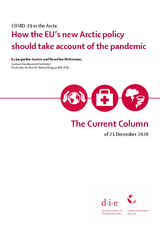COVID-19 in the Arctic
How the EU’s new Arctic policy should take account of the pandemic
Götze Jacqueline / Dorothea WehrmannThe Current Column (2020)
German Development Institute / Deutsches Institut für Entwicklungspolitik (DIE), The Current Column of 21 December 2020
All around the world, the impact of the pandemic is dominating reviews of the year just gone. The “coronavirus crisis” erupted suddenly and unexpectedly into our daily lives and has become a new focal point for political cooperation, often making other global challenges such as climate change seem less pressing by comparison. It is a different story in the Arctic, where there is an urgent need for action in both tackling the coronavirus crisis and dealing with the transformative effects of the climate crisis. Markus Rex, leader of the MOSAiC expedition to the Arctic, describes climate change in a poignant manner: “The Arctic ice is dying.” At the same time, COVID-19 is infecting more and more people in the remote region – people for whom providing medical care poses a unique challenge. The EU, which will adopt a new Arctic policy next year as part of the European Green Deal, therefore needs to harness the current momentum for political cooperation if it is to mount an effective fight against the twin crises of coronavirus and climate in the Arctic and around the world.
“What happens in the Arctic does not stay in the Arctic. It affects us all.” – this clear indication of the region’s importance came from Virginijus Sinkevičius, the European Commissioner for Environment, Oceans and Fisheries, shortly before the launch of the public consultation on the EU’s new Arctic policy. The EU intends to play a pioneering role in the future, armed with a “clear and coherent Arctic policy”. If this is to succeed, the EU will need to take the lessons learned from the pandemic into account because COVID-19 has exacerbated existing inequalities and challenges in the region, particularly in terms of infrastructure and healthcare. During the pandemic, for example, Arctic communities that live far away from major healthcare centres have been more reliant than ever on the limited infrastructure (including digital infrastructure). High transport costs, border closures and disrupted supply chains often pose a risk to people’s lives.
Local strategies, such as the One Health approach for the Arctic, which was developed in cooperation with indigenous experts and which considers the health of human beings, animals and the environment from a holistic perspective, are contributing to a better understanding of short- and long-term consequences of the climate and coronavirus crises. However, local structures are being eroded by the economic fallout from the pandemic, with key income streams drying up due to the slump in retail, tourism and mining. At the same time, many parts of the Arctic are being weakened by record-high unemployment. The EU should promote forums that contribute to a pan-regional dialogue involving local actors and institutions in order to advise on challenges on a transnational basis and devise potential solutions to problems in an inclusive way. Making the EU Arctic Forum, which was set up as a “temporary forum” in accordance with the EU’s 2016 Arctic policy, into a permanent fixture could thus inject key momentum into the new iteration of that policy. The forum has followed a multi-stakeholder approach, enabled regional trends to be discussed and focused particularly on the issues of international cooperation and climate change.
The EU should also continue its existing work in the region – especially its support for research activities, which are vital for gaining a better understanding of the complex regional processes of change and represent a major contribution by the EU to transnational cooperation in the Arctic. The multilateral cooperation in the Arctic Council, the most important intergovernmental forum in the region, has also achieved outstanding successes in knowledge creation. Already in summer, the Arctic Council produced an extensive report on the impact of the pandemic in the region, which was written together with local and indigenous experts. The report also served as a basis for the council’s advice on measures for tackling the impact of the pandemic, which it issued in November. Rather than marking a new departure for the forum, this “method” of cooperative knowledge creation and informed political implementation also guides the fight against climate change. In other words, a glimpse into the Arctic is “worth it” – and can reveal numerous examples of successful transnational (knowledge) cooperation for tackling global crises that are also relevant to the EU.
Once again, greenhouse gases in the atmosphere have hit new record levels this year. Priorities in political cooperation can be shifted quickly, as the coronavirus pandemic has shown. Instead of homing in on the negative consequences of the pandemic, 2021’s reviews of the year will hopefully focus on successful strategies for tackling it that provide a blueprint for dealing with other crises – both in the Arctic and across the globe.
This text was produced as part of the research project “Sustainable Urban Development in the European Arctic (SUDEA): Towards Enhanced Transnational Cooperation in Remote Regions” (project no. 426674468), which is being funded by the German Research Foundation (DFG).



